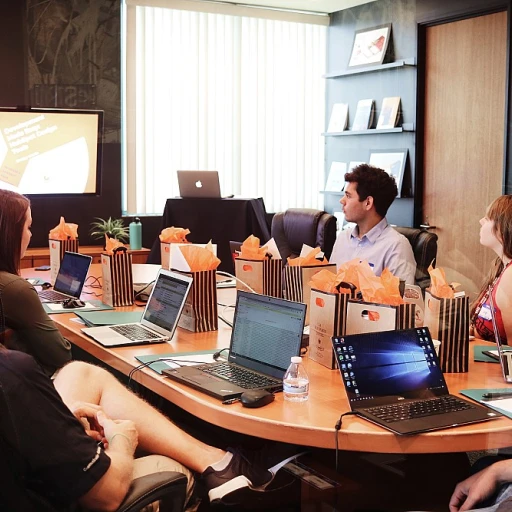AI's Role in Modern Recruitment
Transforming Talent Acquisition
Artificial Intelligence (AI) is no longer a futuristic concept; it has firmly entrenched itself in the world of recruitment, changing the way companies identify and onboard talent. The integration of AI in recruitment processes is reshaping the traditional methods of sourcing candidates, streamlining the hiring process, and supporting HR professionals in making informed decisions. AI can process large volumes of data at astonishing speeds, enabling recruiters to analyze candidate profiles more efficiently than ever before. These smart systems use algorithms to sift through resumes, identify potential candidates, and even predict their success in specific roles. This capability offers a level of precision and objectivity, allowing HR teams to focus on strategic decision-making rather than routine tasks. Moreover, AI-driven recruitment tools can eliminate biases that human recruiters might unintentionally introduce during the hiring process. By evaluating candidates based solely on data and predefined criteria, AI helps foster a more inclusive and diverse workforce, addressing one of the pressing challenges in today’s employment landscape. To delve deeper into how AI is transforming the hiring process, explore this resourceful guide. With AI’s role cemented in modern recruitment, companies are increasingly recognizing the benefits of adopting artificial intelligence to enhance candidate engagement and streamline their processes. In the subsequent sections, we will explore top AI recruitment tools, the efficiencies they bring to the hiring process, and the potential future trends that will continue to shape the landscape of talent acquisition.Top AI Recruitment Tools to Consider
Leading AI Recruitment Solutions to Keep on Your Radar
As organizations increasingly look to artificial intelligence to enhance their recruitment processes, it's crucial to identify the leading AI tools that can make a substantial impact. These solutions are designed to tackle various aspects of hiring, from sourcing candidates to refining the selection process. One standout tool is Pymetrics, an AI-driven platform that uses neuroscience and machine learning to assess candidates' cognitive and emotional traits, ensuring a fit with organizational culture and specific job roles. By utilizing game-based assessments, Pymetrics provides a more engaging candidate experience while improving the accuracy of hiring decisions. HireVue is another significant contender, offering a sophisticated video interviewing platform that leverages AI to analyze verbal and non-verbal cues. This helps recruiters understand candidates better and make more informed decisions. By providing insights beyond resumes, HireVue emphasizes the candidate's potential and fit for the organization. For recruiters focused on streamlining tasks, Arya by Leoforce offers AI-powered sourcing capabilities that go beyond keyword matching. Arya's predictive analytics identify candidates who are not only qualified but also likely to have a genuine interest in the role. Moreover, Eightfold AI provides a comprehensive talent intelligence platform that facilitates internal mobility, diversity hiring, and personalized candidate engagements. Its algorithms optimize the recruitment process by harnessing past hiring patterns and predictive analytics. These tools exemplify how artificial intelligence is shaping recruitment, by creating a seamless integration of technology to enhance the experience for both employers and candidates. As the landscape of recruitment tech continues to evolve, staying informed about these innovations is essential for harnessing AI's full potential in the hiring process.Streamlining the Hiring Process with AI
Optimizing the Recruitment Workflow with AI
In today's fast-paced recruitment landscape, leveraging artificial intelligence doesn't just enhance candidate engagement or reduce costs; it fundamentally transforms the hiring process itself. AI recruitment tools are designed to optimize the recruitment workflow, ensuring a seamless experience for both the hiring team and candidates alike. By automating repetitive tasks and providing valuable insights, these tools can greatly streamline the various stages of hiring, from sourcing candidates to onboarding. One significant advantage of integrating AI into recruitment is its ability to handle massive data volumes quickly and accurately. These tools can sift through countless resumes, identify the most promising candidates, and even predict which candidates are likely to succeed in a given role. This efficiency not only saves time but also allows HR professionals to focus more on strategic tasks, such as nurturing relationships with top talent and building a strong company culture. Moreover, AI-driven recruitment tools can enhance compliance and reduce potential biases in the hiring process. By using algorithms to evaluate candidates based solely on their skills and experience, companies can ensure a more equitable hiring process, leading to a diverse and inclusive workforce. For organizations looking to harness artificial intelligence to revolutionize talent acquisition, understanding how AI recruitment tools optimize the hiring process is crucial. If you're interested in exploring how these innovations can elevate your recruitment efforts, consider delving deeper into AI's transformative impact on the hiring process.Enhancing Candidate Engagement with AI
Fostering a More Personalized Experience
In the ever-evolving landscape of recruitment, engaging candidates effectively has become more challenging. Enter artificial intelligence, a powerful ally for creating a more personalized experience at every stage of the hiring process. Through AI recruitment tools, companies can revolutionize the way they communicate with candidates, leading to higher engagement and better hiring outcomes. AI-driven chatbots, for instance, are transforming the interaction between recruiters and applicants. These intelligent systems offer real-time assistance, promptly answering candidate queries and providing updates about the recruitment process. This immediate and constant line of communication ensures that candidates feel valued and informed, significantly improving their overall experience. Another AI feature enhancing engagement is personalized job recommendations. By leveraging machine learning algorithms, recruitment platforms can analyze a candidate’s profile to suggest roles that closely align with their skills and career aspirations. As a result, candidates can weigh more relevant opportunities, increasing the likelihood of finding a role that suits them best. Furthermore, AI tools can tailor content and communication strategies in a way that resonates with individual candidates. Automated emails, personalized based on a candidate's interaction history and preferences, can keep them engaged throughout the recruitment journey. The benefits of these tailored interactions have been highlighted in earlier parts of this article, emphasizing the need for top-notch AI recruitment tools to achieve effective and efficient outcomes. As organizations continue to harness the power of AI in recruitment, it's essential to adopt and learn from these advanced tools to stay ahead in the race for top talent. Embracing AI means not only enhancing efficiency but also transforming the candidate’s journey into a more engaging and personalized experience, paving the way for a more dynamic and responsive recruitment process. The next frontier in AI-driven recruitment is not solely about utilizing these tools but ensuring they are integrated seamlessly into the broader recruitment strategy, creating a synergy between technology and human touch that enriches the candidate experience.Cost and Pricing Considerations
Balancing Budget and Benefits
Incorporating AI recruitment tools into your hiring strategy can be a game-changer, but it's essential to weigh the costs against the benefits. While AI solutions can significantly streamline the hiring process and enhance candidate engagement, understanding the financial implications is crucial for making informed decisions.
Understanding the Investment
AI recruitment tools come with varying price tags, often depending on the features offered and the level of customization required. Some platforms offer basic functionalities at a lower cost, while more advanced solutions with predictive analytics and machine learning capabilities may require a higher investment. Organizations need to assess their specific needs and budget constraints to select the most suitable tool.
Evaluating ROI
The return on investment (ROI) for AI recruitment tools can be substantial when considering the time saved and the improved quality of hires. By automating repetitive tasks, such as resume screening and interview scheduling, HR teams can focus on more strategic activities. Additionally, AI tools can help reduce turnover rates by identifying candidates who are a better fit for the company culture and role requirements.
Hidden Costs to Consider
Beyond the initial purchase or subscription cost, there are potential hidden expenses to consider. These can include integration with existing HR systems, training for staff to effectively use the new tools, and ongoing maintenance or updates. It's important to factor these into the overall budget to avoid unexpected financial strain.
Making an Informed Choice
When selecting an AI recruitment tool, it's beneficial to conduct a thorough cost-benefit analysis. Consider the long-term advantages of improved efficiency and better hiring outcomes against the upfront and ongoing costs. By doing so, organizations can make a well-rounded decision that aligns with their financial and strategic objectives.








